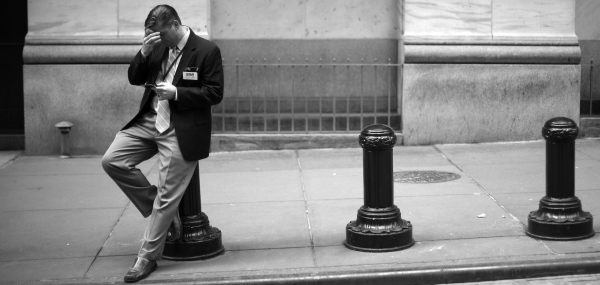Conventional wisdom holds that during tough times—such as today’s feeble, disheartening economic climate—the lines between right and wrong blur. Reliably decent people, whether on the street or in the boardroom, find the compromising conditions in which they live sufficient justification to bend the rules, to find grey hues in colors otherwise reflected as black and white, and to excuse their own transgressions as externally driven. No reproach of personal character is evoked when one acts as the necessity demands. “It’s not my fault,” one might protest. “I’d lose my job if I didn’t do it!” Or, “Come on, others are getting their fair share, why not me?”
This line of reasoning is a chief product of several hundreds of years of economic theory that has been absorbed into the public consciousness. From Adam Smith through David Ricardo, Thomas Malthus, John Stuart Mill, and, recently, Milton Freeman, economists interested in big issues like the allocation of national resources have had to make assumptions about what motivates average folk. The answer? Self-interest. “What’s in it for me?”
Self-interest is a perfectly reasonable speculation that is an undeniable human quality. Anyone who’s raised children knows that no matter how nurturing and generous the environment, kids are self-centered little seeds way before life’s lessons have hardened them.
There is, to be sure, truth to this egocentric picture of human nature. But it doesn’t nearly explain the whole story. The problem with assumptions is that when used across the board, they start to resemble that narcissistic child desperately forcing a square peg into a round hole, even though it doesn’t fit.
Economics predicts that in good times, self-interest is satisfied and thus more charitable, civilized behavior trumps baser instinct. Self-interest is, after all, rational, which means that when one has enough, one would, rationally, let others have their’s. The satiated creature gives the hungry one a turn at the trough. It’s a nice thought, but it’s fundamentally flawed.
The last two decades of economic prosperity are examples of how good times don’t always make for good conduct. At the zenith of America’s success, neither Wall Street nor the Capital seemed overly concerned with the ethical minutia that, when woven together, describes the character of a society. It’s most often the little things that, in the midst of plenty, seem like small ethical potatoes. The accounting of the market value of an asset as a profit on a balance sheet, or the creation of financial products from derivatives—whether appropriate or not—is cast as acceptable when the sun shines. It’s natural to think of oneself as an invulnerable master of the universe when all goes according to plan. It’s easy to excuse personally beneficial lapses when the overall tide lifts. It’s convenient to dismiss another’s failure as incompetence when one’s own star is rising.
So when do humans become humane? Even a casual read suggests that we are most ennobled when most disadvantaged. Strength triggers arrogance, which leads to belief in a just world where those who’ve fallen deserve their fate. They are the inept or cowardly products of a simple Darwinian equation. In contrast, weakness triggers vulnerability, which leads to a belief that anyone can fall prey to life’s vicissitudes. Here, sympathy, not superiority, is evoked.
The armies of recently relieved in Detroit, New York, and elsewhere, have a pristine empathy for their own and others fragility. This is not a class or a religious allegiance, but a psychological one. The fate of laid-off lawyers, financiers, consultants and managers is directly equivalent to that of skilled laborers that find their life’s circumstances inconsolably discombobulated. Misfortune, or the prospect thereof, is life’s great equalizer.
Psychology, not economics, provides a more compelling explanation for how we come to grips with tumultuous times. When times are stable and munificent, we humans erect intellectual and emotional structures that allow us to revel in the conviction that we are in control of our lives and thus not susceptible to fortune’s foul winds. These structures let us take credit for success and deny blame for failure. They furnish the fallacy that bad things only happen to bad people (which, by the way, we are most certainly not counted among), enabling a life free of agonizing uncertainty.
But when, as inevitably happens, the hard rain falls, these structures are punctured. They no longer protect or prevent awareness of our vulnerability. The experience of exposure to vulnerability is both poignant and terrible. It is at these moments and in these times that empathy is most heightened. The chastening reminds us that life is unpredictable and unfair, which in turn gentles our attributions of others. The result is that benevolence bests bestiality.
The reality or prospect of hard times breeds compassion and connection, not coldness and correction. When the tectonic plates of life shift underfoot they are accompanied by an equally powerful psychological shift. The recognition of our own vulnerability casts the vulnerability of others into sharp relief, which in turn triggers sympathy and a renewed appreciation of “there but by grace go I.” In today’s recessionary times, there’s every reason to believe that munificent conduct will rule the day.
For the Washington Post version, click here.
- Business Leaders must face ultimate Covid Question, and a clash of Interests - January 14, 2022
- “Homers” are Creating the Soulless Downtown - December 27, 2021
- Revising Urban Economies by Returning to the Office: The case of the Nation’s Capital - November 21, 2021


 Subscribe to my channel
Subscribe to my channel

You need targeted traffic to your Munificence in Misfortune: How Bad Times Make for Good Conduct | Lessons on Leadership website so why not try some for free? There is a VERY POWERFUL and POPULAR company out there who now lets you try their website traffic service for 7 days free of charge. I am so glad they opened their traffic system back up to the public! Check it out here: http://exit.pk/2